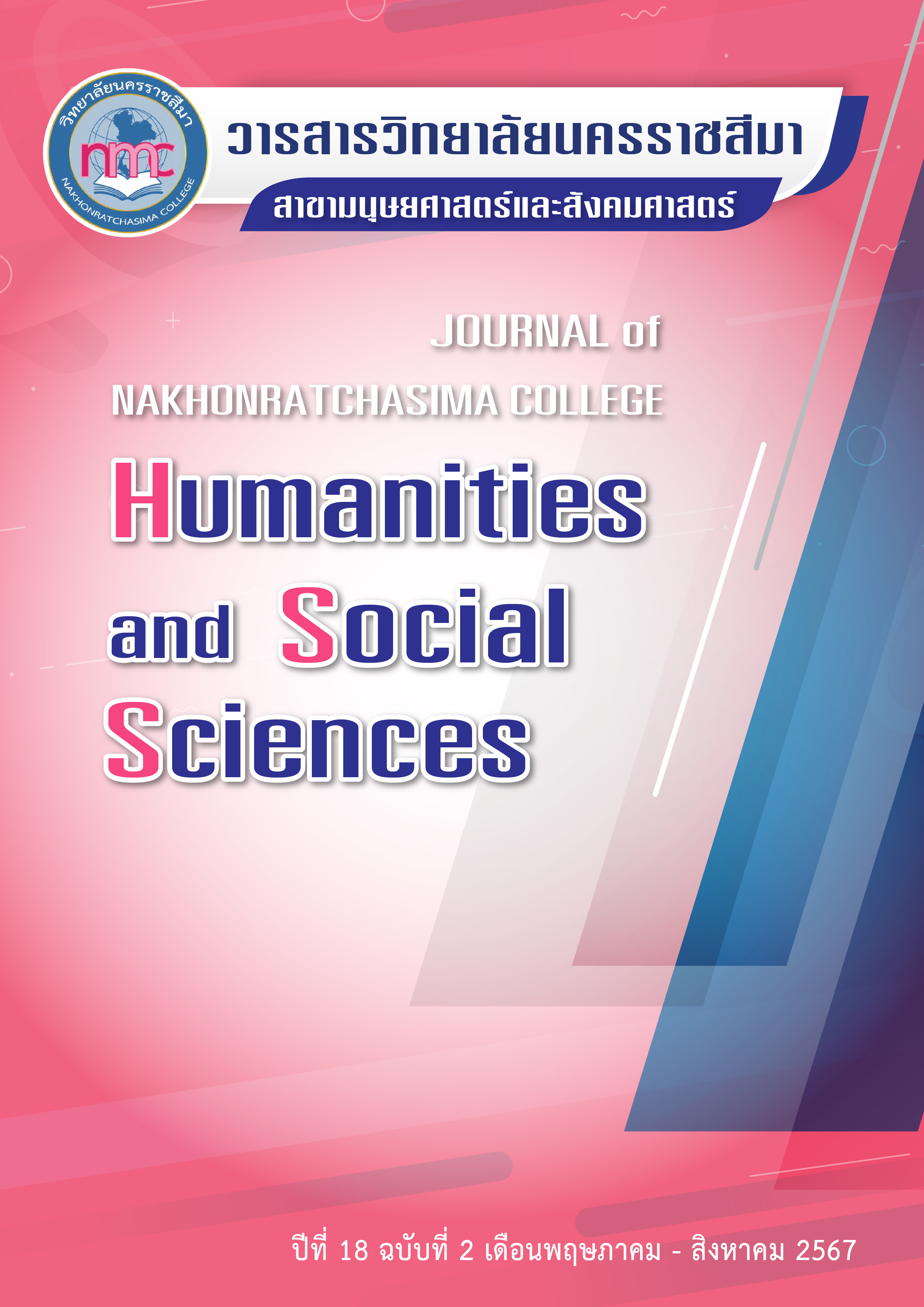Enhancing Vocabulary Acquisition in Vocational Dramatic Arts Education At Kalasin College: Task-Based Learning and Implications for English Communication Skills
คำสำคัญ:
Task-Based Learning, Vocational Education, English Communication Skills, Vocabulary Acquisition, Dramatic Arts, Thailand, COVID-19 Pandemicบทคัดย่อ
The COVID-19 pandemic has precipitated profound changes in global education, prompting rapid adaptation and innovation to sustain learning continuity. In Thailand, vocational education, emphasizing practical skills and language proficiency, faced pivotal adjustments. This study explores the efficacy of Task-Based Learning (TBL) in enhancing English communication skills, specifically vocabulary acquisition, within the Dramatic Arts program at Kalasin College of Dramatic Arts. Vocabulary acquisition is pivotal for effective communication and academic success, essential for students poised to represent Thai arts and culture internationally. Through integrating TBL, which engages students in real-world tasks, this research demonstrates significant improvements in vocabulary acquisition, overall language proficiency, and communication skills among vocational students. The findings underscore TBL’s transformative impact on traditional teaching paradigms, empowering students for global professional environments. This study advocates for ongoing refinement of TBL methodologies, supported by continuous educator professional development and technological integration for effective remote and hybrid learning models. By equipping students with robust communication skills, educators play a crucial role in preparing them for successful global careers while promoting Thai cultural heritage on the international stage.
เอกสารอ้างอิง
Bannister, D., & Remesal, A. (2020). The impact of COVID-19 on education. Educational Researcher, 49(3), 164-166.
Byram, M. (1997). Teaching and assessing intercultural communicative competence. Multilingual Matters.
Conrad, D., & Donaldson, J. A. (2011). Engaging the online learner: Activities and resources for creative instruction. John Wiley & Sons.
Department of Foreign Languages, Kalasin College of Dramatic Arts. (2022). CDAKS Language Test Results.
Durongkaveroj, M. (2022). The challenges of remote learning: Lessons learned from the COVID-19 pandemic. Bangkok Post.
Ellis, R. (2015). Understanding second language acquisition (2nd ed.). Oxford University Press.
Ellis, R. (2009). Task-based language learning and teaching. Oxford University Press.
Galaya, N. (2009). Developing English vocabulary learning activities for third grade elementary school students using games. Master’s Thesis, Curriculum and Instruction Program, Graduate School, Khon Kaen University.
Graduate School of Fine Arts, Ministry of Culture. (2019). Master of Arts in Fine Arts Curriculum. Retrieved from https://www.bpi.ac.th/upload/media/2022/06/898862a17ee0b8fd0.pdf
Hartnett, M., St. George, A., & Dron, J. (2011). Examining motivation in online distance learning environments: Complex, multifaceted, and situation-dependent. The International Review of Research in Open and Distributed Learning, 12(6), 20-38.
Littlewood, W. (2004). The task-based approach: Some questions and suggestions. ELT Journal, 58(4), 319-326.
Loades, M. E., Chatburn, E., Higson-Sweeney, N., Reynolds, S., Shafran, R., Brigden, A.,
... Crawley, E. (2020). Rapid systematic review: The impact of social isolation and loneliness on the mental health of children and adolescents in the context of COVID-19. Journal of the American Academy of Child & Adolescent Psychiatry, 59(11), 1218-1239.
Long, M. (1985). Input and second language acquisition theory. In S. Gass & C. Madden (Eds.), Input in second language acquisition (pp. 377-393). Newbury House.
Means, B., Toyama, Y., Murphy, R., & Baki, M. (2013). The effectiveness of online and blended learning: A meta-analysis of empirical literature. Teachers College Record, 115(3), 1-47.
Miller, D., & Redding, S. (2016). The state of education reform in Thailand: Challenges and opportunities. Asia-Pacific Education Researcher, 25(3), 423-435.
Nation, I. S. P. (2001). Learning vocabulary in another language. Cambridge University Press.
Nation, I. S. P. (2013). Vocabulary size, text coverage and word lists. Vocabulary Learning & Instruction, 2(1), 14-23.
Nunan, D. (2004). Task-based language teaching. Cambridge University Press.
Palloff, R. M., & Pratt, K. (2009). Assessing the online learner: Resources and strategies for faculty. Jossey-Bass.
Pholying, A., & Panawas, S. (2015). Using task-based instruction in teaching English vocabulary for fifth-grade students. In Proceedings of the National Conference on Creativity and Development for Advancement towards ASEAN Community (2nd ed., pp. 318-327). Nakhon Ratchasima, Thailand: Nakhon Ratchasima College.
Pholying, T., & Wichayapong, T. (2016). Learning activities using tasks in teaching English vocabulary for 5th-grade students at Ban Kho Khin Lek Fai School, Sung Nern District, Nakhon Ratchasima Province. Journal of Rajabhat Roi Et University, 58-65.
Robinson, P. (2001). Task complexity, task difficulty, and task production: Exploring interactions in a componential framework. Applied Linguistics, 22 (1), 27-57.
Selwyn, N. (2020). Education and technology: Key issues and debates. Bloomsbury Academic.
Skehan, P. (1998). A cognitive approach to language learning. Oxford University Press.
Willis, D., & Willis, J. (2007). Task-based language teaching: What type of tasks? ELT Journal, 61(3), 296-304.
Willis, D. (1996). A framework for task-based learning. Longman.
ดาวน์โหลด
เผยแพร่แล้ว
รูปแบบการอ้างอิง
ฉบับ
ประเภทบทความ
สัญญาอนุญาต
จรรยาบรรณผู้เขียนบทความ
ผู้เขียนบทความต้องรับรองว่าบทความนี้ไม่เคยตีพิมพ์ในวารสารใดหรือสิ่งพิมพ์อื่นๆ มาก่อน ต้องไม่คัดลอกผลงานผู้อื่นมาปรับแต่งเป็นบทความของตน และไม่ได้อยู่ระหว่างการเสนอเพื่อพิจารณาตีพิมพ์ อีกทั้งยอมรับหลักเกณฑ์การพิจารณาและการตรวจแก้ไขบทความต้นฉบับโดยกองบรรณาธิการวารสารวิทยาลัยนครราชสีมา สาขามนุษยศาสตร์และสังคมศาสตร์
บทความทุกเรื่องได้รับการตรวจพิจารณาทางวิชาการโดยผู้ทรงคุณวุฒิที่มีประสบการณ์และมีความเชี่ยวชาญตรงตามสาขาของบทความ ซึ่งผู้เขียนต้องแก้ไขตามคำแนะนำของผู้ทรงคุณวุฒิภายในระยะเวลาที่กำหนด หากไม่เป็นไปตามกำหนดกองบรรณาธิการขอสงวนสิทธิ์และยกเลิกการตีพิมพ์โดยจะแจ้งให้ทราบต่อไป
ข้อความที่ปรากฏในบทความของวารสารนี้เป็นความคิดเห็นของผู้เขียนซึ่งไม่เกี่ยวข้องกับวิทยาลัยนครราชสีมาแต่อย่างใด และกองบรรณาธิการขอสงวนสิทธิ์ในการพิจารณาและตรวจประเมินบทความเพื่อตีพิมพ์ในวารสารของวิทยาลัยนครราชสีมา สาขามนุษยศาสตร์และสังคมศาสตร์



